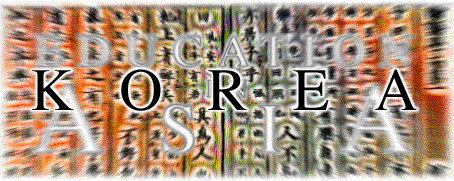KOREA

| Age | Type of School | Education |
|---|---|---|
| 6-11 | Elementary | Primary |
| 12-14 | Junior High / Technical | Secondary |
| 15-17 | High / Advanced Technical | |
| 18-22 | University / Etc. | High |
| 23-25 | Graduate School |
Educational system of Korea is consisted of 6-year elementary school, 3-year junior high school, 3-year high school, and 4-year college. This is because various American educational assistance programs had permeated through Korea after the World War II. By the way, elementary schools were called People's school until recently. However, now, in 1996, they are called elementary school since the name had some problems.
Competition on passing entrance examinations is fierce in Korea. But the situation is not as serious as in Japan, for example, which children face competitive exams even when entering kindergartens. Amazingly, students in Korea take an entrance exam pratically once and for all.
This was the result of "standardization policy" during 1960s to 1980s. The following is the history of the policy.
In 1960s, owing to problems such as lack of finances, junior high school wasn't compulsory yet. Therefore, whether entering junior high school or not was up to the students. However, since students were eager to go on to the next stage of education, and also competition on entering schools was unlimited, it was necessarily competitive to enter schools. As the competition overheated, it became natural for students to take extracurricular lessons for preparation. There also had been problems such as teachers having a part time job at cramming school, and students' overconcentration in prestigious shools.
In order to solve this problem, the school district system was introduced. However, this system was nothing but causing another overconsentration in each of the school districts. Therefore, in 1969, the Government began to carry out a drastic reform. This is the "Standardization Policy."
The heated competition of junior high school went down since the drastic policy was adopted. Entrance exam of junior high schools(national and private) was abolished, and instead, admission was given by lottery. Prestigious schools of those days were closed down and reused as high schools.
But a new problem occured, that the fever of entering schools transfered from junior high to high schools, as a matter of fact. Therefore, the Government adopted a similar reform plan on high schools, and then the situation was improved. But still, there were some students who 'studied away' in 'prestigous schools' in some rural cities, since the policy wasn't permeated enough.
Since that is the case, it was natural that entering good universities became important. Extra-curricular lessons, tutors, crammers etc. made the situation more serious. This time too, a drastic reform was carried out. Things written above were prohibited. To put it concretely, students and teachers who worked as a tutor were dismissed from school or had their teacher's license suspended, and cramming schools were banned (Schools for entrance exam rejectees and repeaters were permitted tacitly). Current circumstances on entering schools are as the following.
Exam for entering universities is the only entrance exam. A day of a Korean high school student preparing for the test is like this. Getting up at 6:00, arriving at school by 8:00, taking a make-up lectures till 9:00, regular classes till 16:00, other supplementary lessons till 18:00, taking supper and then studying by theirselves till 22:00. There are quite a few students who go to crammers and libraries after dinner.
In college, after 2nd and 3rd year, there are a lot of male students who join the army, and an age difference among students in campus become large. Needless to say, it is reflecting educational situation in Korea. We hope that young energy will aim at something else than military affairs.
Special Thanks to:
Source:
http://park.org/Japan/TokyoNet/aip/HOT/EDUCATION/korea.html


No comments:
Post a Comment